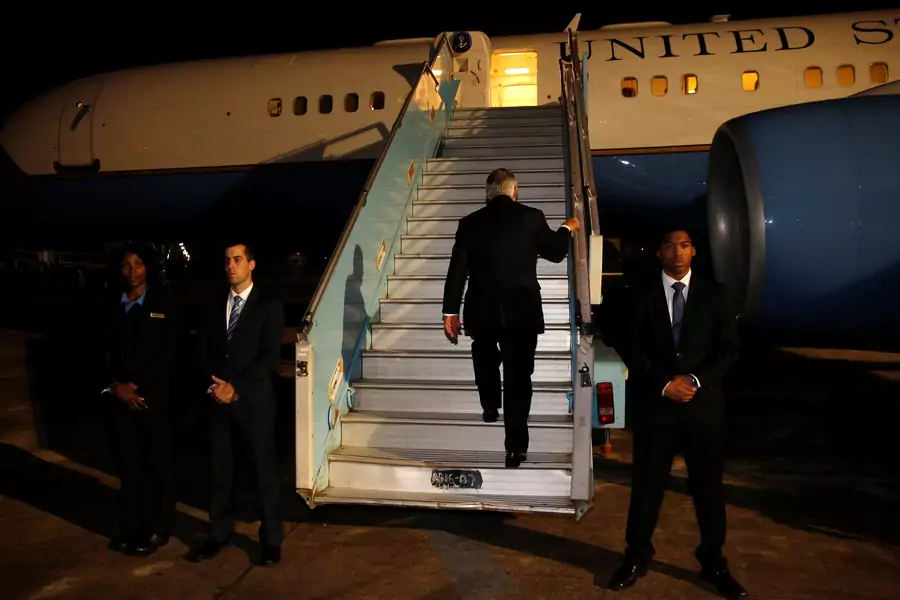Tillerson, Pompeo, and the State of State

Mike Pompeo inherits a State Department that has been marginalized in the conduct of U.S. foreign policy and where staff morale is at rock bottom thanks to the misguided reorganizational efforts of his predecessor and the blatant disdain the White House has shown the foreign service officers and civil servants responsible for the conduct of American diplomacy.
Rex Tillerson was always an unconventional choice for America’s senior diplomat, and he never made the transition from corporate CEO to the leader of a large government bureaucracy. He undermined himself by making several grievous managerial mistakes. To begin with, he concentrated all policy deliberations and decision-making within the State Department equivalent of the C-suite, relying on a tiny coterie of advisors in his seventh floor offices, rather than delegating responsibility for policy formulation to knowledgeable officials in the relevant regional and functional bureaus. He compounded this error by launching an effort to restructure the department in the name of “efficiency,” a useless and time-consuming distraction that diverted attention and resources away from actually handling the world’s most pressing challenges.
More on:
To make matters worse, Tillerson failed to fill senior appointments, leaving multiple departmental bureaus without an assistant secretary of state a year into his tenure. The upshot was a U.S. diplomatic corps without adequate political direction, in which top slots were filled by “acting” officials naturally reluctant to adopt forward-leaning policy positions, or even to clarify to foreign interlocutors where the United States actually stood on issues ranging from North Korea to humanitarian crises.
Tillerson also failed to protect the State Department from assaults launched by the conservative nationalist ideologues surrounding President Trump, including Stephen K. Bannon and, after his departure, Stephen Miller. These self-described “anti-globalists” regarded the State Department as enemy-occupied territory, populated not by hardworking American patriots but by sellouts willing to trade U.S. sovereignty for a mess of internationalist pottage. Their answer, as evinced in the budget requests that Office of Management and Budget presented to Congress in 2017 and 2018, was to try to starve the State Department of funds, by slashing approximately thirty percent of its budget (a gambit foiled, at least in part, by internationalist-minded Republicans in Congress).
As a final insult, Tillerson embraced the absurd nationalist notion that placing “America First” requires abandoning the ideals of democracy and human rights that the United States has long promoted globally under both Democratic and Republican presidents. In May 2017, the secretary declared that the pursuit of “values” too often collided with “policies” that would advance the national interest. The message to State Department employees—as well as to foreigners—was unmistakable: The United States no longer stood for human freedom—and neither should American diplomats.
Tillerson’s apologists would no doubt say his was an untenable position—asked to bring foreign policy coherence to an administration headed by a chaos president who gleefully tweets whatever is on his child-like mind regardless of whether he undercuts his chief diplomat or creates international incidents. But there is no constitutional obligation to serve as Trump’s enabler. A man with greater integrity as well as pride would have resigned long ago, particularly after repeated humiliations and policy defeats on issues ranging from North Korea to Russia to climate change.
Now to Foggy Bottom comes Mike Pompeo, director of the CIA and former Kansas congressman. The hard-charging Pompeo, a graduate of West Point and Harvard Law School, has one advantage Tillerson lacked: the president’s ear. Whether he will be good for the State Department—and for the country—is another matter. It will depend in part on whether he leavens his hawkish instincts with an appreciation for the hard and often painstaking work of diplomacy. Pompeo will need to persuade the department’s foreign service officers and civil servants that he respects their expertise and professionalism. The model to follow is that of Colin Powell. He won loyalty and performance from the State Department by treating his assistant secretaries as his “field generals” (as he called them) and by defending the department vigorously in budgetary battles.
More on:
Speaking of generals, Pompeo will need to decide whether to resist—rather than encourage—one of the most alarming trends in U.S. global engagement: the ongoing militarization of U.S. foreign policy. The tea leaves here are not encouraging. Pompeo is an outspoken advocate of covert action, which he expanded at the agency. Observers will be watching whether his obsession with counterterrorism and hard power more generally leads him to short change investments in “soft power”—the traditional bread and butter of the State Department and the U.S. Agency for International Development.
But the biggest question is whether Pompeo, whose loyalty has endeared him to the president, will stand up to Trump when the latter threatens to create diplomatic chaos or recklessly ignores threats to the United States. Pompeo’s record at the CIA offers cold comfort here. While he managed to insulate the CIA from overt White House meddling, he occasionally coddled the president’s worst instincts—as when he claimed, without evidence, that Russian meddling in the 2016 presidential election had not influenced its outcome.
 Online Store
Online Store